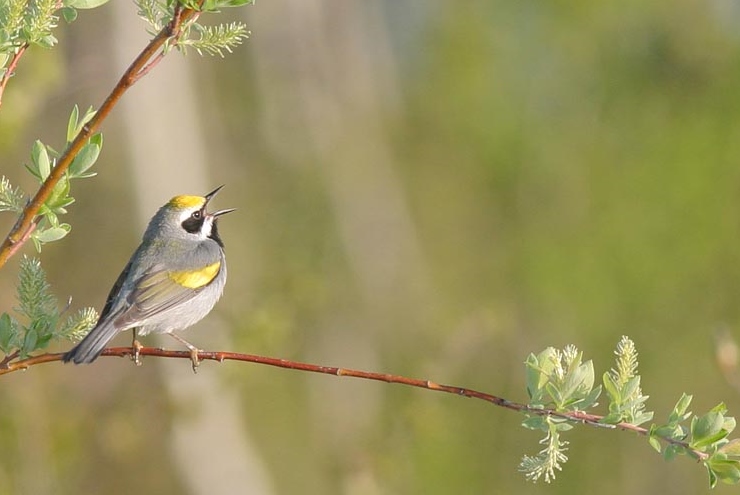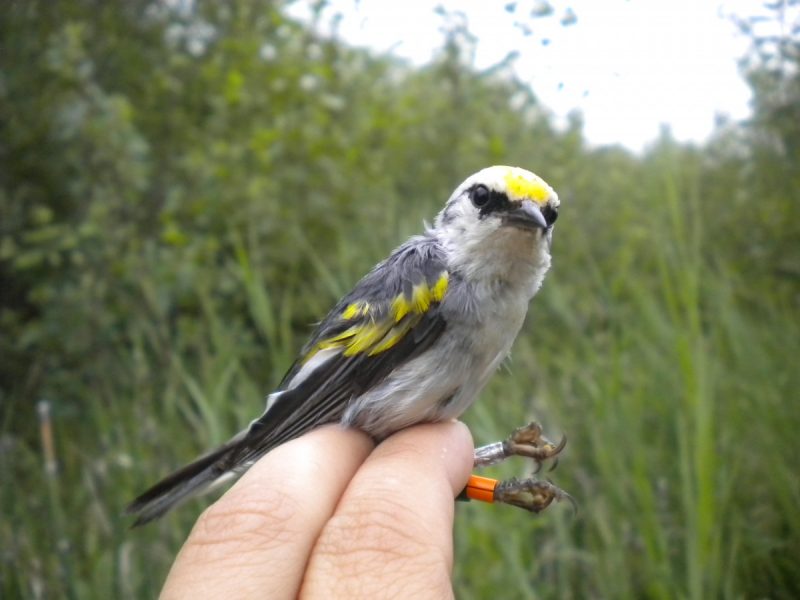
Golden-winged Warbler. // Photo: Christian Artuso
Trouble in Manitoba’s golden-winged warblers population
Genetic change is underway in what was once thought to be the most genetically pure population
Manitoba offers a special home to golden-winged warblers and until recently we were thought to have the most genetically pure populations of these striking songbirds. But new research suggests this is changing.
Golden-winged warblers across North America have been declining for many decades, as a result of habitat loss and interbreeding with a closely-related species, the blue-winged warbler. Historically, these two species were mostly isolated from each other, however, habitat conversion from forest to agriculture gradually brought the two species into contact. For reasons still not well understood, when golden-winged and blue-winged warblers share a habitat, blue-winged warbler populations almost always take over within a matter of decades, until golden-winged warblers no longer exist there.

A blue-winged/golden-winged warbler hybrid, a type called a Brewster’s warbler. // Photo credit: Laurel Moulton
Until recently, Manitoba’s golden-winged warblers, which mostly live in the boreal transition zone of southeastern Manitoba, as well as in the central Interlake and from Riding Mountain to the Porcupine Hills, were thought to be among the most genetically pure population of golden-winged warblers in the world. But scientists from the University of Manitoba, Environment Canada and Bird Studies Canada have published a paper in December’s issue of the journal Conservation Genetics demonstrating that hybrid golden-winged/blue-winged warblers have been observed in Manitoba, and that some individuals here that look like golden-winged warblers actually also carry blue-winged warbler DNA, further indicating initial stages of hybridization.
Laurel Moulton, the Ph.D. student who was lead author on the study, says that we can help conserve golden-winged warblers in Manitoba by slowing habitat loss and restoring the warbler’s preferred forest habitat. Surprisingly, burning forests and selectively logging trees can actually benefit golden-winged warblers, which prefer deciduous trees like poplar-family and oak.
“Despite a small amount of genetic introgression, we can encourage Golden-winged Warbler population stability by maintaining and creating early-successional habitats within deciduous and mixed-wood forests,” Moulton says. “Management tools such as logging and burning can be used to successfully create the type of habitat that warblers prefer to use. Our research indicates that it is now more important than ever to ensure adequate nesting habitat exists for this unique species.”
Nicola Koper, a professor in the University of Manitoba Natural Resources Institute, supervised the research and says most populations of golden-winged warblers disappear within 50 years of signs of hybridization.
“We can only hope that Manitoba’s population will be an exception,” she says.
Christian Artuso, a research scientist with Bird Studies Canada and co-author of the study, says more study is needed to understand how broad and far-reaching the consequences can be when we change and fragment landscapes.
“Manitoba is a long way from the Appalachian Mountains, where secondary contact between these two species began, but this research demonstrates gene flow effectively across the entire range, which is both impressive and challenging for conservation,” he says.
“We can’t do anything about these birds’ DNA,” says Koper, “but we can create homes for them, to give them the best chance of survival.”
Research at the University of Manitoba is partially supported by funding from the Government of Canada Research Support Fund.






